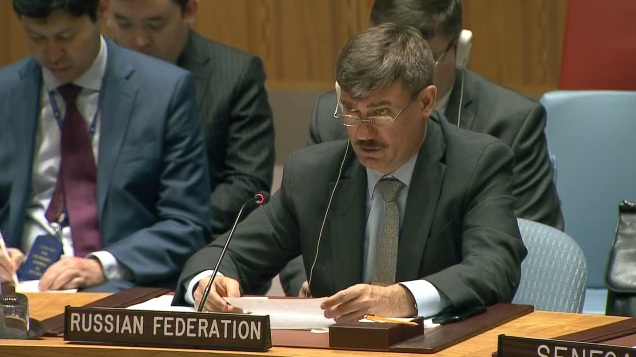Statement by Mr. Petr Iliichev, Chargé d'Affaires, at the Security Council on the South Sudan
We would like to thank the Special Representative of the Secretary-General, Mr. Shearer, for his briefing on the situation in South Sudan, as well as the Deputy Permanent Representative of Senegal, Mr. Ciss, for his briefing on the activities of the Committee established pursuant to resolution 2206 (2015) concerning South Sudan over the recent reporting period. We welcome the personal engagement of the Secretary-General, Mr. Guterres, in favour of finding a solution to the conflict in South Sudan.
We support the initiative to coordinate action in the format of the African Union, the Intergovernmental Authority on Development (IGAD) and the United Nations, which should ensure peace, stability and security in the country. Our view is that IGAD indeed should play a leading role in the process. Generally speaking, we must note the consistent commitment of the Secretary-General to expanding the partnership with the African Union and subregional organizations to resolve the most difficult conflicts on the continent, seeking African solutions to African problems with relevant support from the United Nations, including in South Sudan.
We pay tribute to our colleagues of the Secretariat, who have once again presented a balanced assessment in their monthly briefing. We agree that there has been some progress in preparing for the deployment of the regional protection force. The timetable for the deployment of the advanced teams was slightly delayed, but that is not the fault of South Sudan. The fact is that Juba has maintained a constructive position on the issue of the Regional Protection Force, as evidenced by the Government’s allocation of the first land parcel for deployment. We call on the Secretariat to continue to cooperate with Juba so as to resolve all existing problems with regard to the United Nations Mission in the Republic of South Sudan (UNMISS), including the need to create a mechanism for the prompt resolution of visa problems and for determining the modalities for deploying the regional protection force while complying with the basic norms of peacekeeping.
We note the efforts of the Secretary-General to fully cooperate with all troop-contributing countries as they participate in UNMISS. We have always advocated a thoughtful and mutually respectful dialogue among the parties, especially when it comes to such dangerous missions.
We share the concern of our colleagues about the disastrous humanitarian situation in the country, and we note the efforts of the Office for the Coordination of Humanitarian Affairs to improve things. We call on South Sudan to ensure conditions conducive to the provision of international humanitarian assistance to those in need. We welcome the statement of President Kiir on granting humanitarian access to regions that are experiencing a food crisis.
We would be remiss were we not to note the assistance provided to the people of South Sudan by neighbouring countries, in particular the Sudan, which opened the border crossing in the area of Bentiu, and the hosting by Uganda of a significant number of refugees. At the same time, we stress that the famine in various parts of South Sudan, just as that in neighbouring Somalia and Kenya, is the result not only of security problems but also of bad weather, which has been recognized by representatives of international humanitarian organizations, among others.
We agree that it will be impossible to stabilize South Sudan without a full ceasefire and the launching of an inclusive political process. In that connection, we welcome President Kiir’s announcement that a national dialogue will be held in the framework of the Agreement on the Resolution of the Conflict in the Republic of South Sudan. In principle, our view is that the parameters of a national dialogue and the location of the consultations should be determined by the South Sudanese themselves. It would be unfair to blame the ongoing violence exclusively on the Transitional Government of National Unity, which, as we know, has declared unilaterally a ceasefire. It is important that the opposition take similar measures. We hold the view that, to a large degree, the security incidents are the result of command-and-control problems, as well as a lack of discipline among party ranks. We must not forget the splintering of the anti-Government forces between supporters of Taban Deng Gai and Machar, as well as clashes among members of different ethnicities and criminal gangs.
Our position on the tightening of Security Council sanctions against South Sudan has not changed. If we are to establish lasting peace in South Sudan, what we need is not a Security Council arms embargo, but rather targeted measures to disarm civilians and demobilize and reintegrate combatants. We also believe that it is essential to heed the views of the countries of the region that the discussion of the introduction of additional restrictions on Juba is counterproductive.
Against that backdrop, we draw attention to the duplicity of the approach of some of our colleagues who appear to strongly advocate introducing an arms embargo in the Security Council, but outside the Chamber bring pressure to bear on independent members of the Panel of Experts on South Sudan established pursuant to resolution 2206 (2015), who are investigating the possible involvement of those Council members in supplying weapons to South Sudan.
